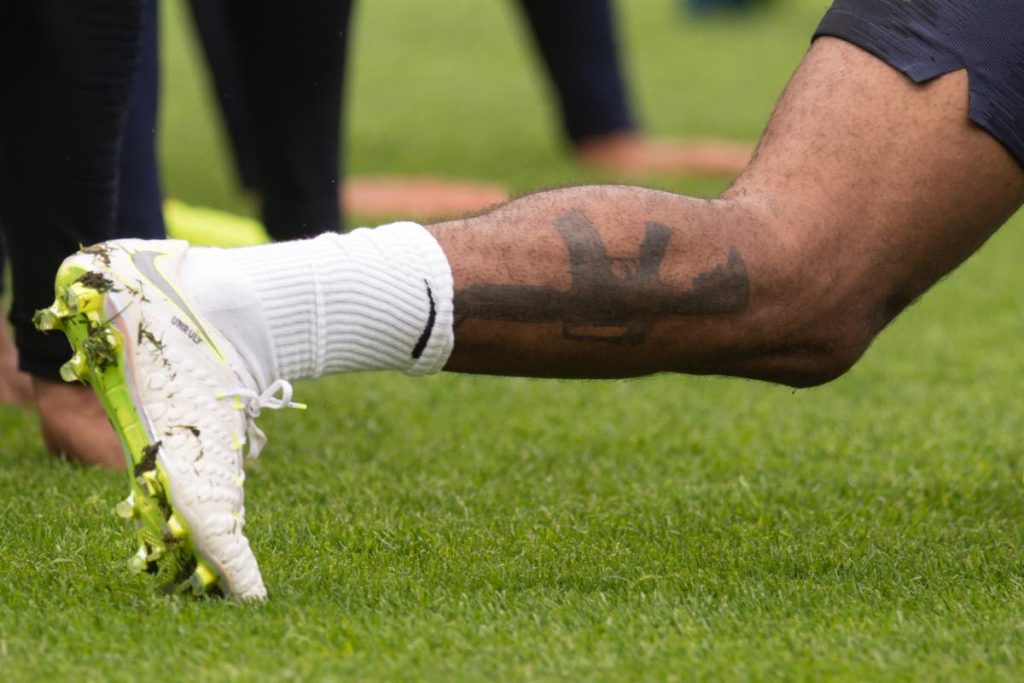Raheem and the un-asterisked gun tattoo

Josh Surtees
You shouldn’t need an asterisk on your tattoo so people can look up what it means. That was the verdict of a friend back home in London on Raheem Sterling’s M16 assault rifle inking.
The Jamaican-born footballer came under fire in the tabloid press this week after posting an Instagram picture of himself in training, socks rolled down to reveal a huge tattoo of a machine gun covering his right shin.
Sterling, who has just won the Premier League with Manchester City and will represent England at the World Cup later this month, promptly explained that the tattoo had an ulterior meaning.
He said his father was gunned down in Kingston when he was two and that he promised himself he would never touch a gun. Instead, he implied, his right foot is his weapon – firing balls not bullets.
That footnote was not tattooed on his body, and critics – including spokespeople from anti-violence charities – found the symbolism of the gun irresponsible.
The Football Association defended Raheem, and several commentators lambasted the tabloids for repeatedly targeting Sterling.
I can see both sides. Yes, Sterling is an easy target for the right-wing press: a young, rich, successful working class black man. But on the other hand, guns are bad. Impressionable fans don’t look for hidden meaning, they just see a gun tattoo and think it’s cool.
We live in an age where weapons are censured and celebrated in equal measure.
Every mass shooting brings a wave of revulsion among liberal folk. But when we hear rap stars talking about grabbing Uzis and going rat-a-tat-tat, liberal folk are less revolted.
Rap videos nowadays show rappers holding weapons, ammunition, pistols tucked in their belts.
In Britain, the music videos that accompany UK drill – a sub-genre of grime – show performers on council estates with masks over their faces rapping about gang fights and drive-by shootings. This week, YouTube removed dozens of these videos, following the advice of London’s Metropolitan Police who are working to quell a recent surge in gang-related violence.
A fundamental rule of human behaviour is that people see things and want them – particularly naughty things. If we never saw ice creams as children, we’d never want them. If we never saw pornography as adults, our lives would be quite different. The attraction to guns is more nihilistic, but to what extent does imagery fuel people’s fascination with these death machines?
Scrolling through Instagram, I noticed that a friend of mine, a university-educated middle-class European woman, had liked a picture of a young black man posing with a gun for the camera. I went to the account, which belonged to Detroit photographer Vuhlandes, and saw more beautifully-shot, vivid images of black men holding guns. The portraits were worryingly alluring.
My mind raced with the question, why has she liked this?
Eventually I asked her and she told me that while young black men with guns are often seen as either victims or perpetrators, Vuhlandes’ pictures aren’t like that. They don’t glorify guns, she said, in many pictures they seem to just be fashion accessories. She went on to say that the men are exercising their right to have guns and that there’s no negativity in the pictures or anything to fear.
She asked me what I thought and I told her that I hate guns and think all weapons should be melted down. But I also explained the hypocrisy I grapple with. I enjoy gangsta rap, which obviously doesn't align with my views on guns. In trying to work out why that is, I realised there is a danger that society says, “oh it's black people, that's cool.” Because black people have historic oppressions to fight, why shouldn't they have guns?
But that attitude doesn’t solve gun-related issues and essentially advocates gun violence in black communities. Instinctively, therefore, I’m against gun imagery.
Then I thought back to when I was about 20 and had a huge poster above my bed of the cover of the Primal Scream record, Star. It featured a young Black Panther, Bobby Hutton, holding a rifle outside the Oakland Police Department.
I liked the image and it spawned more bedroom wall art. Whenever I found pictures of women or minorities with guns I would cut them out and put them on my wall. I had women from the PLO wearing keffiyehs holding machine guns, and women from a Northern Irish paramilitary group wearing balaclavas waving their guns at the ceiling.
Back then, I was knowingly flippant about the imagery and the political statements. I liked the idea of oppressed people openly displaying aggression – fighting back.
When redecorating time came, my mum ripped them down and threw them in the bin.
Maybe gun culture is kept going by the folly of youth. Maybe we grow up, like Sterling will one day.


Comments
"Raheem and the un-asterisked gun tattoo"